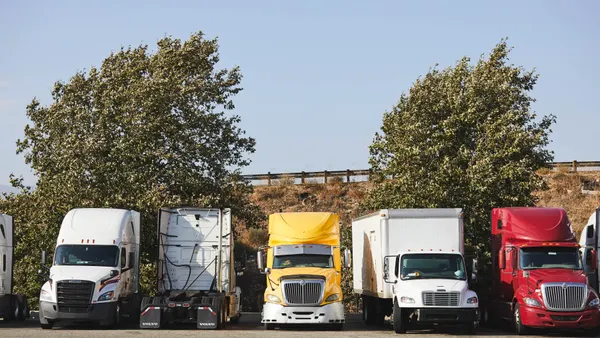Dive Brief:
- Customers reached out to Knight-Swift Transportation Holdings following its LTL expansion in California, Nevada and Arizona, executives said on a Q3 earnings call Wednesday.
- The acquisition of the less-than-truckload division of Dependable Highway Express brought 11 service centers in the Golden State, forming a key link in the company’s aim to provide nationwide coverage on its own.
- “We think California was a game-changer for us,” CFO Andrew Hess told investors. “As we talk to customers that participate in long length of haul freight, we were not even a viable option for them until we had California.”
Dive Insight:
The Southwest expansion provided immediate assets, but Knight-Swift has been patiently working its way to integrate DHE into its network.
The acquisition was effective July 30, but Knight-Swift wanted to make service seamless for customers before scaling operations, CEO Adam Miller said on the earnings call.
“As soon as we announced the DHE [acquisition], we had several customers reach out and say, ‘Hey, when can we start?’” Miller said. “And we said, ‘Well, let's ... get our networks connected. And so you have one system’ ... so it feels like one network to them.”
That integration should be complete in the next seven to 10 days, he said.
AAA Cooper Transportation and Midwest Motor Express say the two companies, along with DHE, “are now fully integrated into one operating system, offering customers seamless interaction, system continuity, and complete visibility from coast to coast.” But coast-to-coast service is coming in November, the subsidiaries’ websites also say.
The DHE terminal acquisitions, plus leases and purchases of former Yellow Corp. facilities, helped Knight-Swift open 34 new facilities in the first nine months of 2024.
For Knight-Swift, the additions are an investment, and the LTL network will be grown into next year, Miller said.
While DHE also contributed a terminal in Arizona and two in Nevada, California had an outsized strategic importance, Hess said.
The acquisitions did create a hit on margins, with its LTL operating ratio in Q3 at 92.5% (adjusted operating ratio of 89.6%), up from 88.6% a year ago (84.9% adjusted). “Adjusted Operating Income declined by 19.5% due to start-up costs and early stage operations at our recently opened facilities,” an earnings release said.
To further expand the LTL network, organic or inorganic growth in the Northeast is the next step, Miller said.
“Progress in this strategy should allow us to unlock new levels of operating performance and margin in the long run,” he said.













